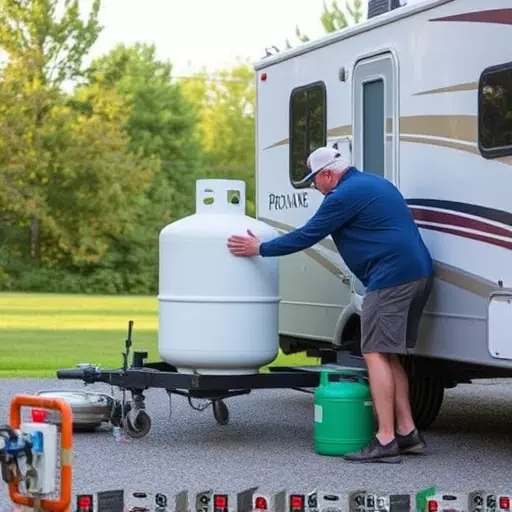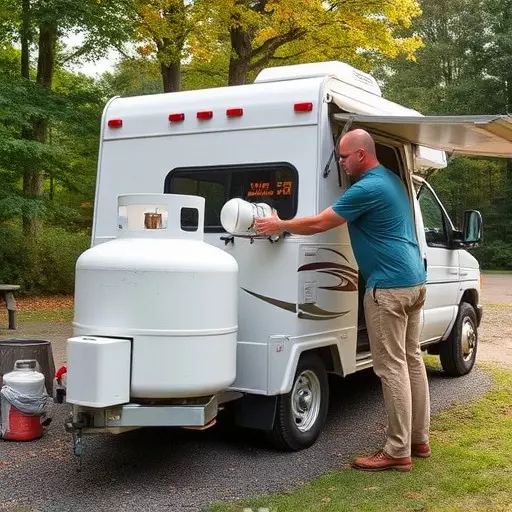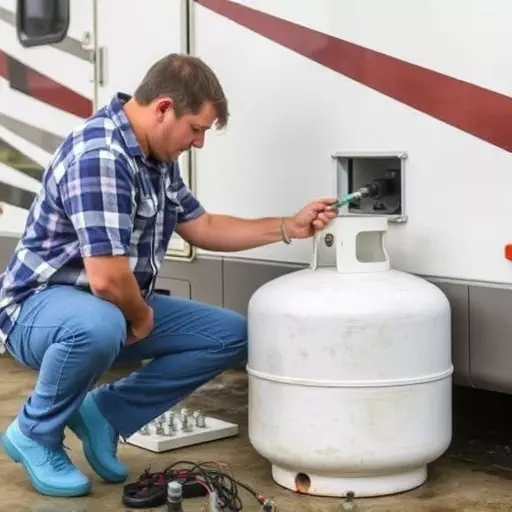RV owners in Camden, New Jersey must prioritize safe propane usage through regular tank inspections before each trip. This includes checking for damage, corrosion, leaks, and ensuring valves are closed when not in use. Adhering to these propane safety guidelines mitigates accident risks associated with propane tanks and systems in RVs, fostering a culture of safety on the roads.
“Ensuring safe propane usage is paramount for recreational vehicle (RV) owners in Camden, New Jersey. This comprehensive guide navigates the critical aspects of propane safety, offering instructional steps and best practices. From understanding your RV’s propane system to inspecting tanks meticulously before each journey, these measures prevent misuse and potential hazards.
Learn about common mistakes to avoid, grasp emergency procedures for leaks or overpressure, and stay compliant with local regulations. Master the art of safe propane utilization and embark on your adventures with peace of mind.”
- Understanding Propane Safety in Recreational Vehicles
- Inspecting Your Propane Tank: A Step-by-Step Guide
- Best Practices for Safe Propane Usage
- Common Mistakes to Avoid When Using Propane
- Propane System Components and Their Functions
- Emergency Procedures for Propane Leaks or Overpressure
- Regulatory Compliance for RV Propane Systems in New Jersey
Understanding Propane Safety in Recreational Vehicles
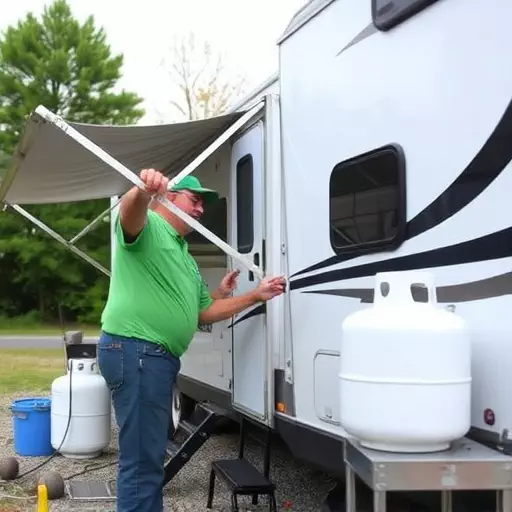
Propane is a popular fuel choice for recreational vehicles (RVs) due to its efficiency and portability. However, safe propane usage requires adhering to specific guidelines to prevent misuse and ensure the safety of RV owners and passengers in Camden, New Jersey, and beyond. Before each trip, it’s crucial to thoroughly inspect propane tanks to identify any signs of damage or corrosion. This simple step can prevent leaks and ensure optimal performance during your journey.
The propane safety checklist should include verifying tank connections, checking for visible abnormalities, and ensuring all valves are in the closed position when not in use. Additionally, understanding how to properly store and transport propane tanks is essential. By following these propane safety guidelines, RV owners can enjoy their travels with peace of mind, knowing they’ve taken the necessary steps to prevent accidents and promote safe propane usage for recreational vehicles.
Inspecting Your Propane Tank: A Step-by-Step Guide
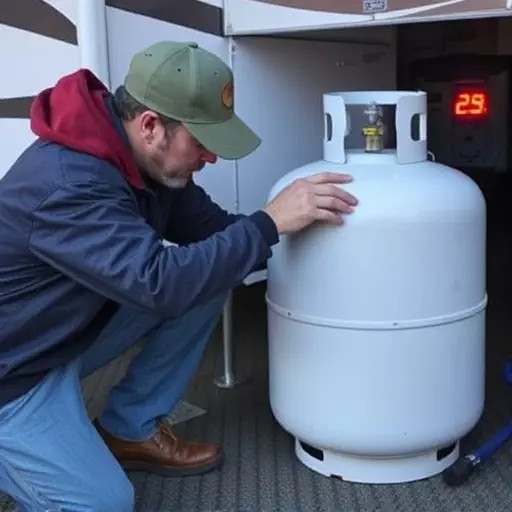
Before every trip, take the time to thoroughly inspect your propane tank. Start by checking for any signs of damage or corrosion on both the tank itself and its connections. Look for leaks by inspecting the seals and gaskets; a simple soapy water test can help detect any vulnerabilities. Ensure all valves are in place and functioning correctly, as a malfunction could lead to dangerous gas buildup.
Next, verify the pressure gauge reads within the recommended range. Most tanks have a capacity of 150 to 250 pounds, and the pressure should be between 10.5 and 14.5 psi (pounds per square inch). If it’s outside this range, it may indicate a pressure regulator issue or a leak in the system. Following these simple steps will help ensure safe propane usage for recreational vehicles in Camden, New Jersey, and beyond.
Best Practices for Safe Propane Usage
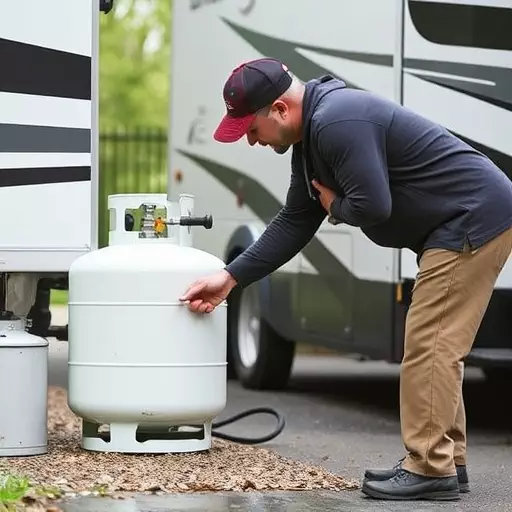
Using propane safely is paramount when operating recreational vehicles (RVs) or any equipment that relies on this fuel source. One of the best practices for RV owners in Camden, New Jersey, and beyond is to establish a thorough inspection routine before each use. This involves checking the propane tank and lines for any signs of damage, corrosion, or leaks. Regular visual inspections, along with periodic professional maintenance, can help prevent accidents related to propane misuse.
Additionally, it’s crucial to follow proper handling procedures. Ensure that all connections are secure and tight, and avoid using equipment or appliances designed for other fuel types with propane. Never leave a burning flame or hot surface unattended near propane tanks or lines, as this could lead to ignition and potential explosions. Always store propane containers in a cool, dry place away from direct sunlight and heat sources, following the manufacturer’s guidelines for safe storage.
Common Mistakes to Avoid When Using Propane

When it comes to using propane in recreational vehicles (RVs) like those found in Camden, New Jersey, users often make mistakes that can lead to hazardous situations. One of the most common errors is neglecting to inspect propane tanks before each use. This simple step is vital as leaks or damage can go unnoticed, increasing the risk of an explosion or fire. Always take a moment to visually inspect for any signs of corrosion, cracks, or physical damage.
Another mistake to avoid is improper handling and storage of propane cylinders. They should never be left unattended, especially in enclosed spaces. Ensure they are securely fastened and stored away from heat sources, open flames, or sparks. Additionally, overfilling propane tanks is a significant risk. Always follow manufacturer guidelines for tank capacity and never exceed the recommended fill levels to prevent potential accidents during use.
Propane System Components and Their Functions

Propane systems in recreational vehicles (RVs) are intricate networks designed to efficiently supply fuel for heating, cooking, and other amenities. Central to this system are propane tanks, which store the gas and are often located under the vehicle. These tanks are typically made of robust materials like steel or aluminum to withstand pressure and ensure safe propane usage for recreational vehicles in Camden, New Jersey.
Along with tanks, regulators play a vital role in controlling the flow of propane from the tank to various appliances. They adjust pressure levels, ensuring a steady supply while protecting against overpressure. Additionally, propane gauges indicate the level of fuel remaining, allowing RV owners to monitor and maintain safe propane safety guidelines for RVs by knowing when to refill. Regular inspection of these components before each use is essential; checking for any signs of damage, corrosion, or leaks can help prevent misuse and ensure a secure and enjoyable camping experience.
Emergency Procedures for Propane Leaks or Overpressure

In case of a propane leak or overpressure, immediate action is crucial to ensure safe propane usage for recreational vehicles in Camden, New Jersey. If you suspect a leak, evacuate the area immediately and turn off the main valve supplying propane to your RV. Open windows and doors to let fresh air circulate, but avoid any sparks or open flames. Contact your local propane supplier or emergency services for assistance.
During an overpressure incident, stay calm and quickly locate the propane tank’s pressure relief device, typically a venting system. Ensure it is functioning correctly and not obstructed. If the situation persists, shut off the propane supply at the source and move to a safe distance until help arrives. Regularly inspecting propane tanks before use is an essential propane safety guideline for RV owners in Camden, helping to prevent such emergencies and promote responsible recreational vehicle operations.
Regulatory Compliance for RV Propane Systems in New Jersey

In Camden, New Jersey, adhering to regulatory compliance for RV propane systems is paramount for safe propane usage. The state has established stringent guidelines to ensure the security and integrity of recreational vehicle propane tanks. Before each use, it’s crucial to thoroughly inspect propane tanks, checking for any signs of damage, corrosion, or leaks. This meticulous process plays a vital role in preventing accidents and mitigating potential hazards associated with faulty systems.
By following these propane safety guidelines, RV owners can confidently navigate the roads while prioritizing their well-being and that of others. Regular inspections and adherence to local regulations are essential steps in promoting safe propane usage for recreational vehicles in Camden, New Jersey.
